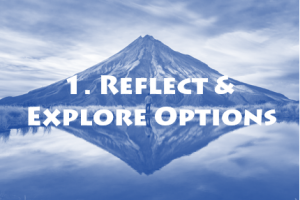Why is Networking Important?
 You’ve probably heard from many people that networking is important, but why? For the job search, networking is important because talking with people can give you unique insights into job responsibilities, company culture, and the inner workings of an organization that you may not be able to glean elsewhere. This information can then help you better present yourself in your application as a strong fit for the role and organization. Networking is also important because who you know matters a lot in the hiring process. If a hiring manager receives over 50 applications for one position, you can bet that the hiring manager will want to hear from her network which applicants she should pay close attention to. If you know someone at her organization who can give you a referral or put in a good word for you, your chances of moving forward in the next steps of the hiring process can be greatly improved.
You’ve probably heard from many people that networking is important, but why? For the job search, networking is important because talking with people can give you unique insights into job responsibilities, company culture, and the inner workings of an organization that you may not be able to glean elsewhere. This information can then help you better present yourself in your application as a strong fit for the role and organization. Networking is also important because who you know matters a lot in the hiring process. If a hiring manager receives over 50 applications for one position, you can bet that the hiring manager will want to hear from her network which applicants she should pay close attention to. If you know someone at her organization who can give you a referral or put in a good word for you, your chances of moving forward in the next steps of the hiring process can be greatly improved.
 Networking, however, takes time. Building good relationships to the point where someone would feel comfortable advocating for you cannot be done over night, so it’s better to start talking with people sooner rather than later. Share information about your background, interests, and achievements with professionals you meet, and remember to stay in touch to keep the relationship going. The more often you network, the more people you’ll be in touch with and the stronger your professional relationships will be as you navigate your career. Don’t forget to keep track of who you’ve reached out to using a spreadsheet, app, or another organizing tool. You can take a look at the spreadsheet included in the Career Guide on Informational Interviews for graduate students and postdocs as a sample. Knowing who you’ve connected with over time will be helpful when you’re ready to begin your job search.
Networking, however, takes time. Building good relationships to the point where someone would feel comfortable advocating for you cannot be done over night, so it’s better to start talking with people sooner rather than later. Share information about your background, interests, and achievements with professionals you meet, and remember to stay in touch to keep the relationship going. The more often you network, the more people you’ll be in touch with and the stronger your professional relationships will be as you navigate your career. Don’t forget to keep track of who you’ve reached out to using a spreadsheet, app, or another organizing tool. You can take a look at the spreadsheet included in the Career Guide on Informational Interviews for graduate students and postdocs as a sample. Knowing who you’ve connected with over time will be helpful when you’re ready to begin your job search.
Who Should I Be Speaking With?
 Start with the people you know first; these are people already in your network. Think of colleagues, friends, classmates, labmates, former supervisors, mentors, family relatives, neighbors, and anyone else you’ve been in contact with throughout your life. Are there people in your social circle in jobs and careers that interest you? After networking with those you already know, you’ll want to network with those you don’t know. Do those in your social circle know other people they can connect you with? Can they facilitate an introduction for you? Having a friend or colleague in common often makes it easier for you to network with someone you haven’t met before.
Start with the people you know first; these are people already in your network. Think of colleagues, friends, classmates, labmates, former supervisors, mentors, family relatives, neighbors, and anyone else you’ve been in contact with throughout your life. Are there people in your social circle in jobs and careers that interest you? After networking with those you already know, you’ll want to network with those you don’t know. Do those in your social circle know other people they can connect you with? Can they facilitate an introduction for you? Having a friend or colleague in common often makes it easier for you to network with someone you haven’t met before.
Beyond your own network, there are thousands of Penn alums around the world that are also part of your network. LinkedIn and MyPenn, Penn’s Alumni Online Community, feature over 150,000 alums in a range of fascinating and meaningful careers. You can use both platforms in conjunction in your research; sometimes you might find information, like an email address, on QuakerNet that isn’t available on LinkedIn and vice versa. The fact that you are affiliated with Penn is a great way to establish rapport and build a relationship with professionals. Don’t forget to also tap into the alumni networks of other institutions you have attended.
Where and When Can I Network?
 The short answer is everywhere! In addition to networking using online platforms, you can network in more structured settings like academic and professional conferences by engaging with people during sessions, breaks, and meal times. You can also network during Penn alumni panels and receptions by asking questions and sharing information about yourself. Networking in less formal settings is also helpful, whether it’s striking up a conversation with someone seated next to you on the plane, reconnecting with old classmates at your college reunion, or chatting with someone at a friend’s wedding.
The short answer is everywhere! In addition to networking using online platforms, you can network in more structured settings like academic and professional conferences by engaging with people during sessions, breaks, and meal times. You can also network during Penn alumni panels and receptions by asking questions and sharing information about yourself. Networking in less formal settings is also helpful, whether it’s striking up a conversation with someone seated next to you on the plane, reconnecting with old classmates at your college reunion, or chatting with someone at a friend’s wedding.
The best time to network is when you don’t need a job! Imagine if you’re a professional, and a graduate student contacts you to learn about your career and shares that she is finishing up her PhD in one month and will need a job soon. How would you feel? Would you feel slightly nervous that this student might expect you to help her find a job? Perhaps you might decide not to meet with her? To ensure that professionals will be as candid and helpful as possible, it’s best to network when you are not under the pressure of needing a job in the near future.
Career fairs are also an excellent way to network and learn more about careers and employers. Employers that are interested in hiring Penn students come to campus every year with the goal of recruiting top talent and filling their hiring needs. By researching the employers attending the fairs ahead of time, you’ll be able to speak with recruiters and Penn alums who represent their employers and ask them questions that can give you insights into particular career paths and work cultures. Each year, Career Services organizes several career fairs in the fall and spring semesters that are open to all graduate students and postdocs.
If you are under time pressure to find a job, we encourage you to network to gather information about career paths, employers, and roles, but do not ask for a job directly. Make an appointment with a Career Advisor via Handshake, and we’ll be happy to help you as you network and apply for jobs concurrently.
What Are Informational Interviews?
 Informational interviews are one-on-one conversations that you have with professionals to gather information about their career path, the jobs they’ve had, the industries they’ve been in, employers they’re familiar with, emerging and future trends in their fields, the skills they’ve developed and used, and more. Think of them as just having a chat with someone to learn about their professional experiences. Remember, the goal of informational interviews is NOT to ask for a job, but rather, to seek information that can help you chart your own career path more effectively.
Informational interviews are one-on-one conversations that you have with professionals to gather information about their career path, the jobs they’ve had, the industries they’ve been in, employers they’re familiar with, emerging and future trends in their fields, the skills they’ve developed and used, and more. Think of them as just having a chat with someone to learn about their professional experiences. Remember, the goal of informational interviews is NOT to ask for a job, but rather, to seek information that can help you chart your own career path more effectively.
Once you conduct an informational interview, you can then use the information you’ve gleaned to make yourself a stronger applicant when you’re ready to apply for the type of jobs you have been learning about. You might even learn that some career paths are not going to be a great match for your skills, interests, or values — this is helpful, too. To learn more, download our Career Guide on Informational Interviews for graduate students and postdocs.
Action items:
- Identify and attend networking opportunities in your department, school, organizations, and at Penn.
- Attend Career Fairs at Penn to learn about specific employers and industries.
- Download and review the Career Guide on Informational Interviews for Graduate Students and Postdocs.
- Consider your academic, professional, and social networks and reach out to those you already know to learn more about their careers.
- Use MyPenn and LinkedIn to find alums in your networks with whom to conduct informational interviews.
- Craft an outreach email that you can use to request informational interviews from professionals.
- Conduct at least 2-4 informational interviews each year; more if you’re near the end of your program.
- Make an appointment with a Career Advisor via Handshake to discuss your networking progress.
- Check out articles related to networking from Carpe Careers, a weekly column focused on career and professional development for graduate students and postdocs that provides personal, optimistic, actionable advice.
- Move on to the next step in your career planning: Professionalize & Gain Experience









